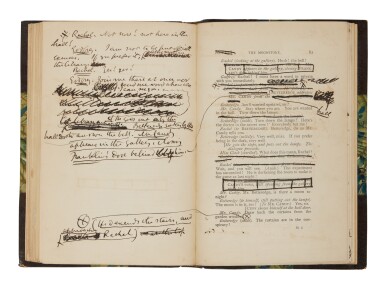Age of Wonder
Age of Wonder

Collins, Wilkie | The author's annotated copy of the rare Moonstone dramatization
Lot Closed
December 9, 08:35 PM GMT
Estimate
30,000 - 50,000 USD
Lot Details
Description
Collins, Wilkie
The Moonstone: A Dramatic Story, in Three Acts. Altered from the Novel for Performance on the Stage. [This Play is not published. It is privately printed for the convenience of the Author.]. [London:] Charles Dickens & Evans, Crystal Palace Press, 1877
8vo (182 x 120 mm). Eighty-eight pages, printed recto only, extensively annotated by Wilkie Collins in sepia ink and pencil (one or two instances of annotations apparently in a second hand); numerous primarily marginal closed tears neatly repaired with tape, some minor fingersoiling and offsetting, p. 83 with marginal chip costing a few letters of manuscript annotation, final leaf backed with paper stabilizing tears. Early half pebble-grain morocco and marbled paper-covered boards, spine with semi-raised bands in six compartments, second and third gilt lettered, others with gilt rules, top edge gilt, marbled endpapers, original plain blue wrappers bound in, with upper wrapper bearing Collins's name and Portman Square address; soiling and chipping to upper wrapper, lower wrapper backed with paper stabilizing some loss. In custom clamshell case.
Wilkie Collins's extensively annotated copy of this exceedingly rare and privately printed work.
Wilkie Collins was a friend, collaborator, and contemporary of Charles Dickens, with The Moonstone originally serialized by the latter in his magazine All The Year Round between 4 January and 8 August 1868 (see lot 1028). During the drafting of the novel, Collins suffered a severe attack of a rheumatic illness, something that plagued him all his life, and which he treated liberally with opium (see lot 1008). Collins’s opium habit found its way into the plot of The Moonstone, and likely contributed to the general tone and energy of the narrative. Perhaps it was this influence that entranced his readers; a masterful amalgamation of the sensational and the realistic, the first edition was an immediate hit, and The Moonstone would prove to be Collins's greatest success. In an effort to exploit this, Collins adapted the novel for the stage in 1877, and the present work was produced with the assistance of his close friend, Charles Dickens.
The stage version of The Moonstone was written in four acts (see Collins's annotation on the title-page of the present lot), and performed at the Royal Olympic Theatre from 17 September to 17 November 1877. Here, through Collins's extensive notes, we are offered a rare glimpse into the author's working process, and the energy behind the production. Of course, both Collins and Dickens routinely participated in dramatic performances, and each had a keen understanding of the process from drafting to acting, rendering Collins's specificity in the present pages natural, though no less remarkable.
The annotations range from relatively minor edits (a line of Godfrey's dialogue struck through on page 13, for example), to substantive revisions of entire scenes. An instance of this occurs at the top of page 52, where Collins begins Act III, functionally rewriting the existing Act II. "The Third Act," he notes at the upper margin. "The time has advanced by a few minutes only. Franklin is discovered seated, on the night. Betteredge and Cuff stand near him." The dialogue is then further altered to reflect these changes in timing, with some passages and stage direction fully excised. Pages 57-59 are almost completely crossed out by Collins, with new dialogue and direction in his hand on the (once blank) versos of the text leaves.
Collins over-simplified the adaptation, omitting the characters of Rosanna Spearman, Ezra Jennings, and the Indian jugglers (three Hindu Brahmins in disguise, determined to recover the diamond at the center of the plot). Collins also restricted the action to a twenty-four hour period at Rachel Verinder's country-house in Kent. The production failed to achieve the glowing reception the novel experienced, and both Henry Neville (playing Franklin Blake) and Laura Seymour (playing Miss Clack) left the cast before the end of the run.
The present lot offers an extraordinary glimpse into Wilkie Collins's practice, and his perceptions of his most celebrated and enduring work. Had the stage production of The Moonstone experienced greater success, it is possible that the present annotations would have been incorporated into some sort of finalized draft or printing. As it stands, however, this lot represents a unique and apparently unpublish example of Collins's working method.
